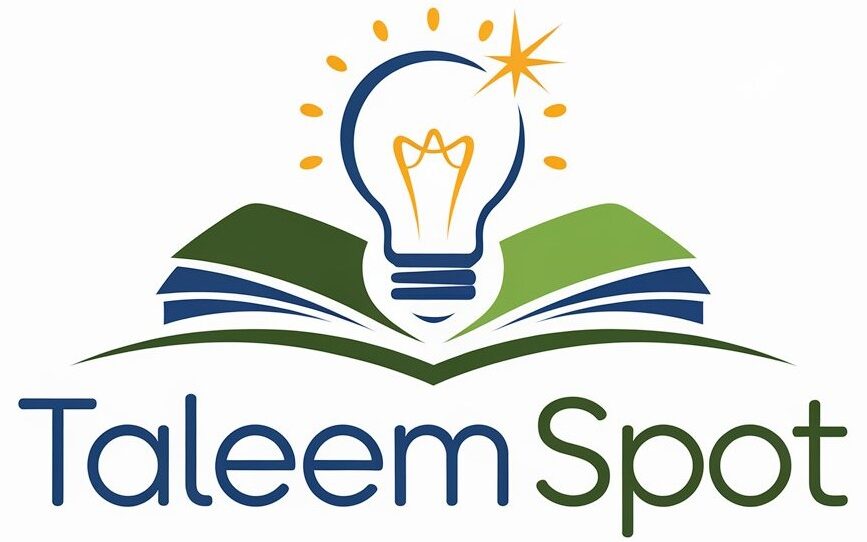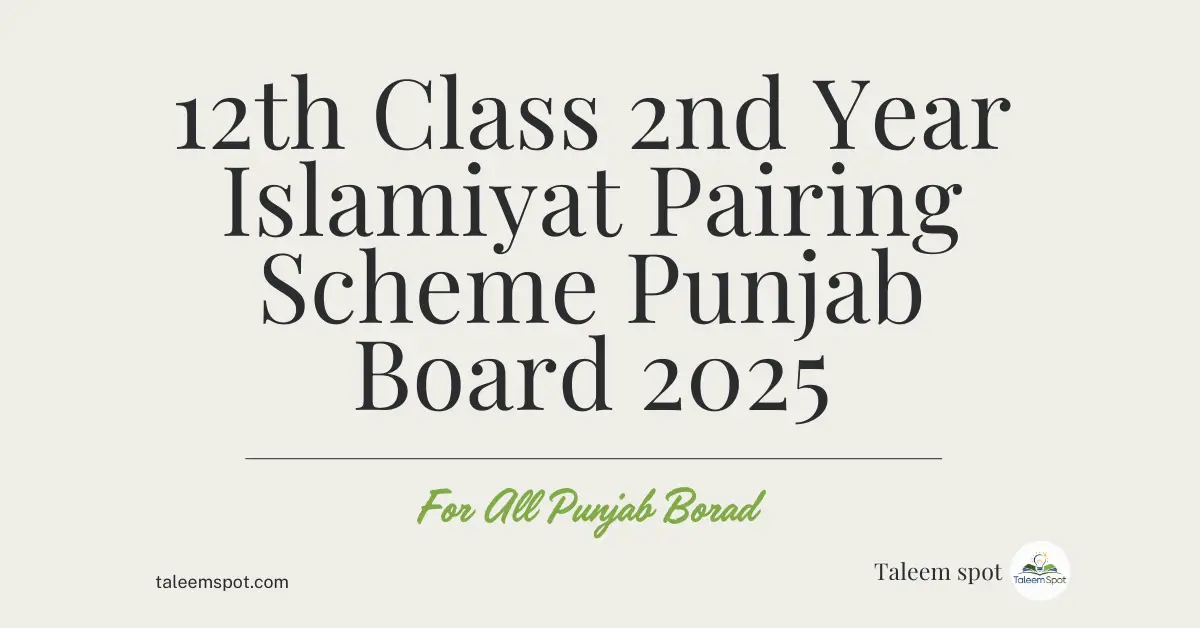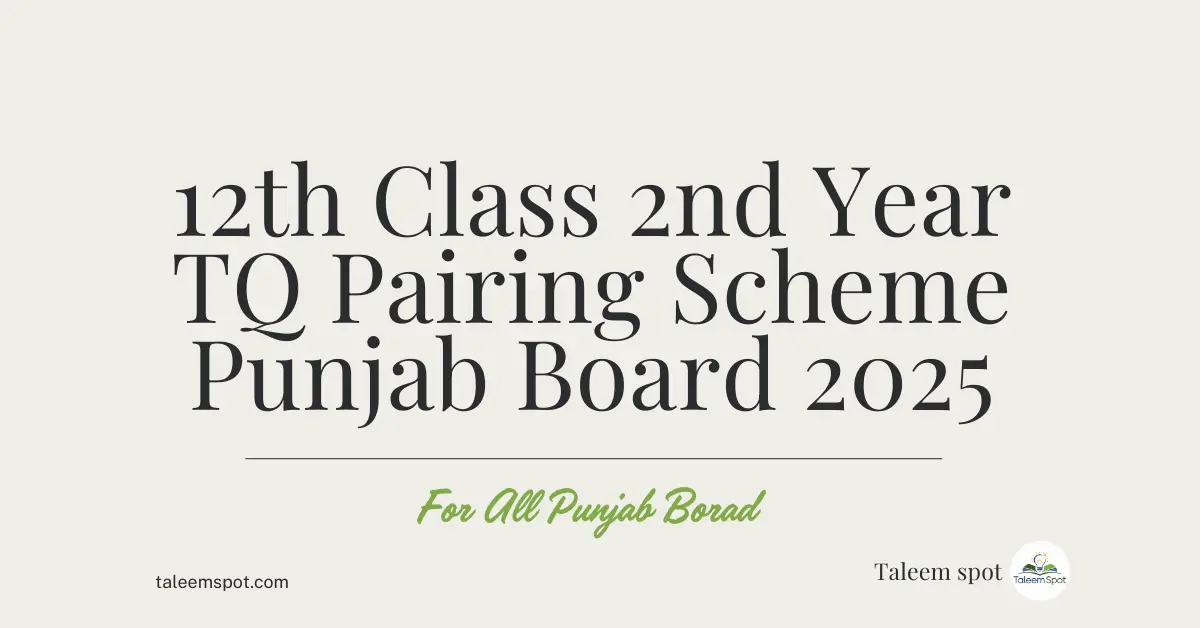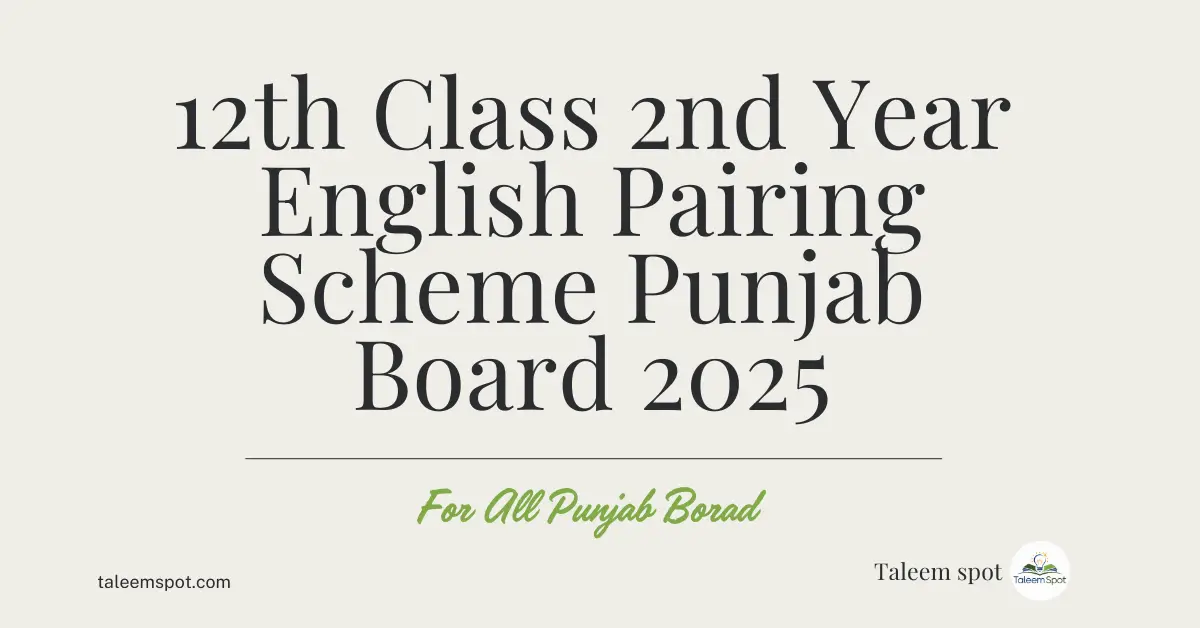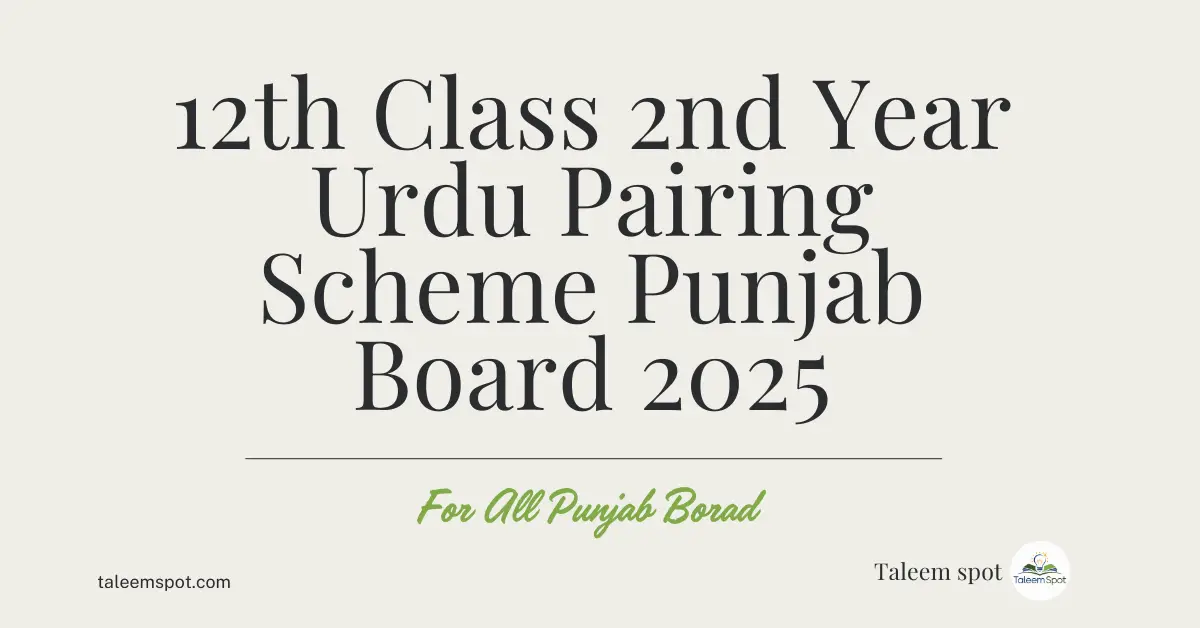For students of the 12th Class 2nd Year, the Islamiyat paper can be a significant part of their final exam preparation. To aid students in their academic journey, the 12th Class 2nd Year Islamiyat Pairing Scheme Punjab Board 2025 is an essential tool that provides a structured guide to what the paper might include. This article explores the importance of this pairing scheme and provides insights for students appearing under various Punjab Boards, including Lahore, Rawalpindi, Multan, Gujranwala, Faisalabad, Bahawalpur, Sahiwal, Sargodha, and Dera Ghazi Khan.
Table of Contents
ToggleThe Punjab Board annually releases pairing schemes to ensure that students can focus their preparation efficiently. These schemes highlight the distribution of topics, question types, and sections in the exam. By leveraging the pairing scheme, students can prioritize key areas, plan their study schedules, and improve their chances of achieving excellent results.
Coming Soon
All Subjects Pairing Scheme : Visit Here
Understanding the 12th Class 2nd Year Islamiyat Pairing Scheme
The 12th Class 2nd Year Islamiyat Pairing Scheme Punjab Board 2025 is more than just a guide; it’s a roadmap for effective study. Islamiyat, being a conceptual subject, requires students to have a clear understanding of Quranic verses, Hadith, Islamic principles, and historical contexts. Here’s how the pairing scheme helps:
1. Prioritization of Content
The scheme divides the syllabus into manageable sections, highlighting key topics likely to appear in the paper. For instance, students can focus on specific Quranic Ayat, Hadith, and long questions based on the pairing scheme.
2. Structured Preparation
It provides a structured approach to study, helping students identify areas of strength and weakness. With the right focus, they can devote more time to challenging sections.
3. Enhanced Time Management
By understanding the distribution of marks and questions, students can allocate their time wisely during the exam. For instance, knowing the weightage of long and short questions can help them plan answers accordingly.
Why the Islamiyat Pairing Scheme is Vital for Punjab Board Students
The 12th Class 2nd Year Islamiyat Pairing Scheme Punjab Board 2025 is designed to ensure uniformity and standardization across all Punjab Boards. Let’s dive into its benefits:
1. Boosts Confidence
Having a clear understanding of what to expect in the exam alleviates anxiety and boosts confidence. With targeted preparation, students feel more equipped to tackle challenging questions.
2. Improves Exam Strategy
Students learn to anticipate the structure of the paper, making it easier to draft a comprehensive exam strategy. This reduces the chances of skipping crucial questions.
3. Consistency Across Boards
Whether you’re a student of the Lahore Board, Rawalpindi Board, or any other Punjab Board, the pairing scheme ensures a standardized approach. It brings fairness and equality to the assessment process.
Coverage of the Pairing Scheme Across Punjab Boards
Students from all Punjab Boards can utilize the 12th Class 2nd Year Islamiyat Pairing Scheme Punjab Board 2025 to excel in their exams. Here’s how it applies to specific boards:
1. Lahore Board
The Lahore Board emphasizes conceptual learning in Islamiyat. The pairing scheme outlines essential Quranic verses and Hadith expected in the exam.
2. Rawalpindi Board
For Rawalpindi students, the scheme highlights the importance of long questions and their pairing, ensuring students focus on detailed answers.
3. Multan Board
The pairing scheme for Multan Board focuses on balancing theoretical and practical aspects, helping students manage their time effectively.
4. Gujranwala Board
With a focus on key topics, Gujranwala Board’s pairing scheme simplifies complex Islamic principles for students.
5. Faisalabad Board
The scheme for Faisalabad Board helps students anticipate potential questions, ensuring targeted preparation.
6. Bahawalpur Board
Bahawalpur students can utilize the scheme to focus on long questions, which are crucial for securing high marks.
7. Sahiwal Board
The pairing scheme for Sahiwal Board provides clarity on short questions, enabling students to prepare concise yet comprehensive answers.
8. Sargodha Board
Sargodha students can benefit from the scheme’s focus on conceptual clarity and exam-oriented preparation.
9. Dera Ghazi Khan Board
The pairing scheme for Dera Ghazi Khan Board ensures equal emphasis on Quranic and historical contexts, fostering balanced preparation.
Effective Strategies to Use the Pairing Scheme
Start Early
Begin your preparation well in advance to cover the entire syllabus effectively. Utilize the pairing scheme to identify high-priority topics.Practice Past Papers
Solve past papers alongside the pairing scheme to familiarize yourself with the exam pattern and time management.Collaborative Study
Engage in group studies to discuss key topics and exchange insights based on the pairing scheme.Seek Guidance
Consult teachers or mentors to clarify any doubts and align your preparation with the pairing scheme.Focus on Long Questions
Given their weightage, ensure you’re well-prepared for long questions as outlined in the scheme.
How the Pairing Scheme Impacts Results
The 12th Class 2nd Year Islamiyat Pairing Scheme Punjab Board 2025 has proven to be a game-changer for many students. Studies show that students who prepare using a structured scheme:
- Achieve higher marks due to focused preparation.
- Experience less stress, thanks to a clearer understanding of the exam pattern.
- Develop a better grasp of the subject, enhancing their overall academic performance.
Key Features of the 12th Class Islamiyat Pairing Scheme
- Division of Syllabus: Organized breakdown of topics and sections.
- Weightage Distribution: Clear allocation of marks for short, long, and MCQ-based questions.
- Focus Areas: Highlighted key topics for in-depth preparation.
Findings
The 12th Class 2nd Year Islamiyat Pairing Scheme Punjab Board 2025 is an invaluable resource for students aiming to excel in their exams. By providing clarity, structure, and focus, it empowers students to achieve their academic goals. Regardless of the Punjab Board, the pairing scheme ensures fairness and efficiency, making it a must-have tool for all students.
FAQs
Q1. What is the importance of the 12th Class 2nd Year Islamiyat Pairing Scheme Punjab Board 2025?
The pairing scheme helps students focus on important topics, manage time effectively, and prepare strategically for exams.
Q2. Is the pairing scheme different for each Punjab Board?
No, the scheme is standardized across all Punjab Boards, ensuring uniformity and fairness.
Q3. Can the pairing scheme guarantee high marks?
While it doesn’t guarantee marks, it significantly enhances preparation, increasing the chances of achieving excellent results.
Q4. When is the pairing scheme released?
It is usually released a few months before the final exams to give students ample preparation time.
Q5. How can I access the pairing scheme for my board?
You can find the scheme on the official Punjab Board websites or through trusted educational platforms.
Q6. Does the pairing scheme include guess papers?
No, the pairing scheme focuses on syllabus breakdown and question distribution, not guess papers.
Q7. How should I use the pairing scheme effectively?
Align your study schedule with the pairing scheme, focusing on key topics and practicing past papers.
Q8. Are long questions more important than short questions?
Long questions typically carry more marks, making them crucial for securing a high score.
Q9. Can I rely solely on the pairing scheme?
No, it should complement your overall preparation strategy, including thorough syllabus coverage.
Q10. Does the pairing scheme change every year?
Yes, the pairing scheme is updated annually to reflect any syllabus or exam pattern changes.
